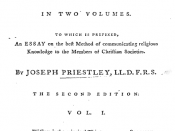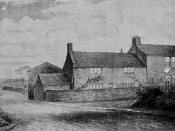Joseph Priestley (1733-1804) attained notoriety for a myriad of accomplishments. Not only was he an insightful, clever researcher, he was also known for his unorthodox philosophical and religious teachings. His contributions include the invention of carbonation, the identification of eight key chemical compounds, and a vast array of writings on subjects ranging from electricity, to politics, to education. It is difficult to understate the impact that Joseph Priestley has had on science and chemistry. Much of our present-day science is based on the experiments Priestley performed.
Joseph Priestley's early life gave no indication of his enormous potential. Born in March 1733, he was the eldest son of a clothmaker in Yorkshire, England. At age nine, he was sent to live with an aunt, Sarah Keighly, when his mother died. There he received a liberal education and was exposed to Dissenting religious doctrine, that is, not belonging to the Church of England.
During a bout with tuberculosis which left him unable to attend school, he solemnly continued his studies, learning French, Italian, German, Chaldean, Syrian, and Arabic, in addition to studies on geometry, algebra, and mathematics. His self-taught curriculum could have gained him entrance to schools such as Oxford or Cambridge, had he not been a Dissenter. Instead, he chose to attend Daventry Academy, a liberal school for Dissenters, studying for the ministry. His attendance at Daventry shaped his future by encouraging debate and experimentation.
After studying at Daventry, he headed a small congregation in Needham Market before accepting a full-time position at the Dissenting Academy in Warrington. This position set the stage for the development of his scientific curiosity. Regular trips to London acquainted him with numerous scientists and free thinkers, most notably Benjamin Franklin, who would become a lifelong friend. Franklin encouraged Priestley in his research, which led to...



Priestley Biography
A good read, kept my interest. Spelling, grammar, punctuation, syntax are all excellent. (Why is it that good writers always seem to worry the most??) You're good for an "A" on this one! Well done!
2 out of 2 people found this comment useful.